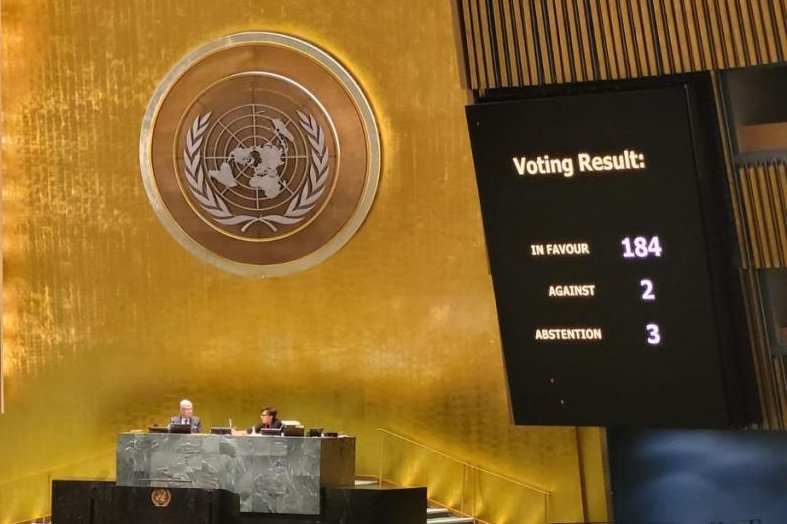
China said allegations regarding Xinjiang are false after U.S. politicians suggested solar panel materials were being produced in the region using forced labor.
File Photo by Stephen Shaver/UPI | License Photo
June 22 (UPI) -- China dismissed allegations of forced labor in Xinjiang after a report suggested the United States was considering a ban on Chinese solar imports.
Beijing's foreign ministry said Tuesday at a regular press briefing that China is strongly opposed to a potential U.S. ban on solar panel materials manufactured in Xinjiang
"The so-called 'genocide' and 'forced labor' in Xinjiang are nothing but rumors with ulterior motives and downright lies," ministry spokesman Zhao Lijian said.
"Its real purpose is to restrict and contain the development of relevant sectors and enterprises in China. It is imposing on China 'forced unemployment,' 'forced poverty' and unfair competition."
Zhao's statement comes after Politico reported the Biden administration is reviewing a ban on solar panel material from Xinjiang.
Polysilicon, the material critical to the proper functioning of most solar panels, is manufactured in Xinjiang. About half the world's supply of polysilicon comes from the region, the report said.
U.S. Democrats on the House Ways and Means Committee have claimed there is "overwhelming evidence" of the use of forced labor in polysilicon production. The import of material produced through forced labor is banned under Section 307 of the Tariff Act of 1930, the report said
U.S. Senate Finance Chairman Ron Wyden, D-Ore., told Politico that determining whether imports involved the use of forced labor is not always easy.
"Supply chain issues can be incredibly complicated, and in some instances it's hard to get reliable information, particularly if you're talking about Xinjiang, [where] their information is tightly controlled," Wyden said. "But aggressive, unrelenting enforcement is, to me, the prescription for this."
China on Tuesday accused the United States of spreading "false information."
Zhao also confirmed the United Nations High Commissioner for Human Rights Michelle Bachelet's upcoming visit to Xinjiang.
"We have repeatedly stated that the visit should be a friendly visit with the purpose of promoting exchanges and cooperation, rather than carrying out a so-called 'investigation'," Zhao said.
June 22 (UPI) -- China dismissed allegations of forced labor in Xinjiang after a report suggested the United States was considering a ban on Chinese solar imports.
Beijing's foreign ministry said Tuesday at a regular press briefing that China is strongly opposed to a potential U.S. ban on solar panel materials manufactured in Xinjiang
"The so-called 'genocide' and 'forced labor' in Xinjiang are nothing but rumors with ulterior motives and downright lies," ministry spokesman Zhao Lijian said.
"Its real purpose is to restrict and contain the development of relevant sectors and enterprises in China. It is imposing on China 'forced unemployment,' 'forced poverty' and unfair competition."
Zhao's statement comes after Politico reported the Biden administration is reviewing a ban on solar panel material from Xinjiang.
Polysilicon, the material critical to the proper functioning of most solar panels, is manufactured in Xinjiang. About half the world's supply of polysilicon comes from the region, the report said.
U.S. Democrats on the House Ways and Means Committee have claimed there is "overwhelming evidence" of the use of forced labor in polysilicon production. The import of material produced through forced labor is banned under Section 307 of the Tariff Act of 1930, the report said
U.S. Senate Finance Chairman Ron Wyden, D-Ore., told Politico that determining whether imports involved the use of forced labor is not always easy.
"Supply chain issues can be incredibly complicated, and in some instances it's hard to get reliable information, particularly if you're talking about Xinjiang, [where] their information is tightly controlled," Wyden said. "But aggressive, unrelenting enforcement is, to me, the prescription for this."
China on Tuesday accused the United States of spreading "false information."
Zhao also confirmed the United Nations High Commissioner for Human Rights Michelle Bachelet's upcoming visit to Xinjiang.
"We have repeatedly stated that the visit should be a friendly visit with the purpose of promoting exchanges and cooperation, rather than carrying out a so-called 'investigation'," Zhao said.









